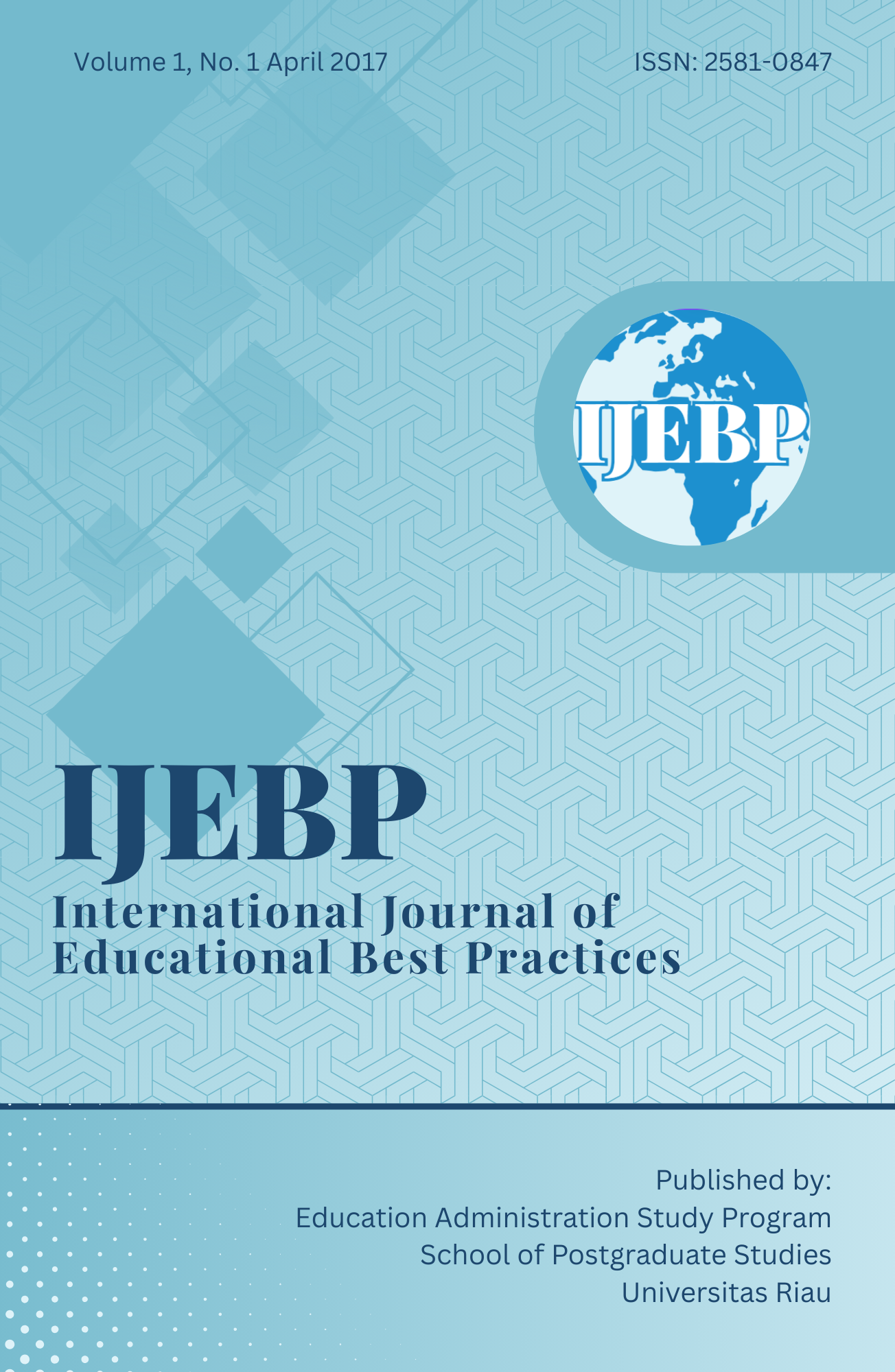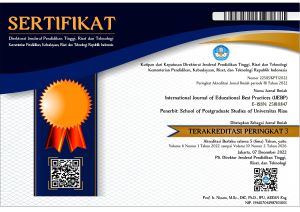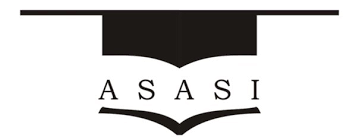The Implementation of Cooperative Learning Model For Critical Thinking Skills in the History Subject at SMA Pekanbaru
DOI:
https://doi.org/10.31258/ijebp.1.1.38-56Keywords:
cooperatvie learning, history education, critical thinking skillsAbstract
In the approach to learning, teachers must be able to create an active, creative, effective, and fun learning. One of the learning approaches that can be used to create this active, creative, effective and fun learning in a group is cooperative learning. Jigsaw was particularly selected from various types of cooperative learning. It was because it is used by researchers in science education, and less popular in social science education. Jigsaw arouse students' attitudes to learning, including in the History subject. Jigsaw that is one ofthe types of cooperative learning models that encourages students to be active and help each others in mastering the subject matter to achieve maximum performance. The aim of the study was to see the different models of cooperative learning on students' critical thinking skills in the History subject. The method used was by using the test statistics with analysis using Excel for Windows. To determine whether there is any differences, tests of paired data (Student's t-test) were conducted. If there are no significant differences between the dependent variable for the pre-test, it will be used followed by ANOVA in the post test. The results showed that there is a difference between the type of cooperative learning model jigsaw with traditional learning in the study on the critical thinking skills of students in the History subject.
References
Abd Rahim Rashid. (1999). Pendidikan sejarah: falsafah, teori dan amalan. Kuala Lumpur: Utusan Publicationss dan Distributor Sdn. Bhd.
Abd Rahim Rashid. (2000). Model dan pendekatan pengajaran sejarah KBSM. Kuala Lumpur: dewan Bahasa dan Pustaka.
Al Muchtar, Suwarna. (2001). Epistomologi dasar konseptual strategis pendidikan ilmu pengetahuan sosial. Forum Pendidikan IKIP Padang No. 01 Th XXV.
Aronson, E., Blaney, N., Stephan,. C., Sikes,. J. & Snapp, M. (1978). The Jigsaw Classroom. Beverly Hills, CA: Sage Publications, Inc.
Atmadinata. (2006). Upaya Meningkatkan Keterampilan Sosial Siswa Dalam Pembelajaran Sejarah Melalui Cooperative Learning. Tesis UPI Bandung: Tidak dipublikasikan.
Brown, R.J.S. (1980). Scapping History and Geografi: Response to Paul Schumann. Education Leadership 37.
Davidson & Kroll, J. (1991). An overview of research on cooperative learning related mathematics. Journal for research in Marhematics Education 22: 362-365.
Depdiknas. (2003). Kurikulum Berbasis Kompetensi Mata Pelajaran Sejarah SMU. Jakarta: Puskur.
Dokolamo, Hamid. (2006). Peranan Metode Penelitian Sejarah Dalam Pembelajaran Sejarah Untuk Meningkatkan Keterampilan Berfikir Kritis Siswa. Tesis UPI Bandung: Tidak dipublikasikan.
Dynneson, T.L & Gross, R.E. (1999). Designing Effective Instruction for Secondary Social Studies, (2nd ed), Upper Saddle River, New Jersey: Prentice Hall.
Eggen dan Kauchac, D.P. (1988). Strategies for teachers: Teaching content and thinking skills. New Jersey: Prentice Hall.
Harold, Koontz. (1980). Management. Seventh Edition. Tokyo: Mc Graw-Hill Kegakusha Ltd. Hartini Bt Husain, (2006). Pencapaian dan Sikap Pelajar Dalam Mata Pelajaran Sejarah Menerusi Pengajaran Berbatukan Komputer. Tesis Sarjana: UKM.
Hasan S.H. (1996). Pendidikan Ilmu-ilmu Sosial. Bandung: FKIS IKIP Bandung.
Ibrahim, M. Fida Rachmadiarti, Mohammad Nur dan Ismono. (2000). Pembelajaran Kooperatif. Surabaya: Universitas Negeri Surabaya Press.
Ibraheem, K. (1997). Winning of psychology. Kuala Lumpur: R.K.Mind Science Consultancy.
Isjoni. (1998). Persepsi Siswa SMA Kota Pekanbaru Terhadap Pembelajaran Sejarah. Proyek Penyelidikan FKIP UNRI. Pekanbaru.
Isjoni. (2000). Pelaksanan Pembelajaran Mata Pelajaran Sejarah di Kaitkan dengan Prestasi Belajar Siswa SMA. Proyek Penelitian UNRI. Pekanbaru.
Ismaun. (2001). Paradigma Pendidikan Sejarah yang Terarah dan Bermakna. Pada Pidato Pengukuhan Jabatan Guru Besar Tetap dalam bidang Pendidikan Sejarah pada Fakultas Pendidikan Ilmu Pengetahuan Sosial Universitas Indonesia 16 Oktober 2001.
Johnson, D.W. & Johnson, R.T. (1991). Learning together and alone: cooperative, Competitive, and individualistic learning. Boston: Allyn amd Bacon.
Khoo Kay Kim. (1995). Faktor-faktor kemerosotan pelajar dalam mata pelajaran sejarah SPM, berita Minggu, 26 Mac.
Marhamah. (2005). Keberkesanan pembelajaran koperatif ke atas pencapaia pelajar dalam mata pelajaran bahasa Inggeris di sekolah menengah pertama Babussalam, Pekanbaru-Riau, Indonesia. Tesis Sarjana UKM.
Nasution, S. (2001). Didaktik Azas-azas Mengajar. Bandung: Jemmars.
Osnardi. (2005). Pengembangan Model Cooperative Learning pada Mata Pelajaran Geografi di SMA. Tesis UPI Bandung: Tidak dipublikasikan.
Rohana, Zubir. (1985). Pembelajaran Sejarah melalui kaedah belajar sendiri. Dalam.Jasbir, S.,
Sharma, J.R. Lim Hong Kuan, Nuraini Salleh & Rohana Zubir (pnyt). Pengajaran dan pembelajaran sejarah di sekolah-sekolah Malaysia, hlm. 86-106. Kuala Lumpur: utusan Publication Sdn. Bhd.
Rohana, Zubir. (1987). Aplikasi teknologi multimedia dalam pembelajaran sejarah: kesan dan masalah. Masalah Pendidikan. 12.89-98.
Sagala, S. (2003). Konsep dan makna pembelajaran. Bandung: Alpabeta.
Santi. (2001). Pelaksanaan pembelajaran cooperative learning tipe jigsaw mata pelajaran matematika di SMA Kota Pekanbaru: Lembaga Penelitian UNRI.
Schult, J. L. (1990). Cooperative Learning : Refining the Process. Educational Leadership 47: 43-45.
Scott, B.W. (1992). Cooperative methods. Journal Science and Children. Pebruary: 30-31.
Shwalb, Barbara J and David W. Shwalb. (1995). Cooperatif Learning in Cultural Contexs: An Integrated Review. Volume 23 (1995) International Journal of Educational Research, page 293-300.
Slavin, R. E. (1980). Cooperative Learning. Review of Educational Research 50: 312-342.
Supardan. (2000). Keativitas guru sejarah dalam pembelajaran sejarah. Studi deskriptif analitis terhadap guru dan implikasinya untuk pengembangan kreativitas guru sejarah SMU di Kecamatan Bandung. Tesis UPI: Tidak dipublikasikan.
Waruwu, Fidelis E. & Drs Sjamsoedin R. Endah. (2004). Persepsi terhadap peran orangtua dan peran guru kaitannya dengan motivasi belajar anak.
Wiyanarti, E. (2003). Pengembangan berfikir kronologis siswa melalui model garis waktu dalam pembelajaran PIPS-Sejarah di Sekolah Dasar. Tesis UPI Bandung: Tidak dipublikasikan.
Yuzar, Muhammad. (2007). Pengaruh teknik jigsaw terhadap hasil belajar sejarah siswa SMAN Kota Pekanbaru. Tesis UNP: Tidak dipublikasikan.
Zahorik, John. (1995). Constructivist teaching (fastback 390). Bloomington, Indiana: Phi Delta Kappa Education Foundation.





